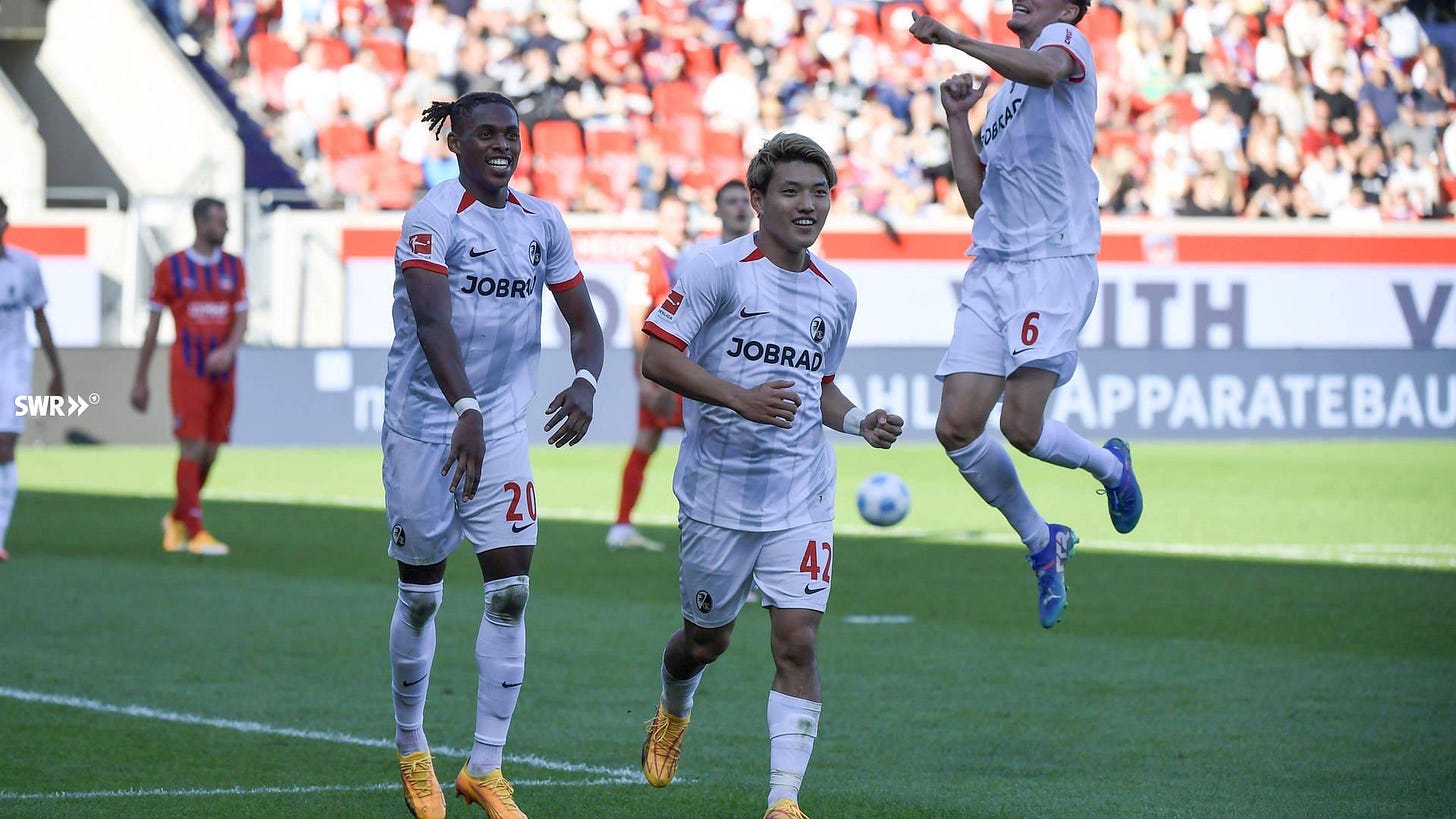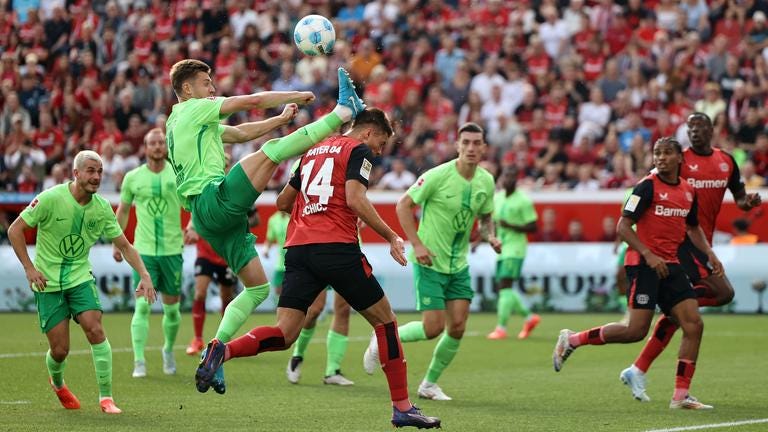Daryl's Notebook: What I learned from German football over last weekend
Moving on from...six Champions League matches during the midweek, I took a quick trip to Germany and enjoyed great entertainment with a goalfest that took place all around the country.
As the midweek Champions League matches now behind us, weekend league football returned across the world with interesting matchups took place at different corners of the globe. While it can be tempting to cover as many leagues and matches in one single Notebook, I want to keep the focus of each instance of the Notebook onto one country and try to learn about the interesting developments within that country.
For this weekend’s edition, I decided to stop by Germany where there seemed to be a goalfest across the country. I do like a bit of attacking football so I will definitely not complain about the number of goals scored across the matches that I picked! Without delaying any further, let’s get into the matches, shall we?
Schalke 04 3-5 SV Darmstadt
Reason for choosing: Both Schalke and Darmstadt were former Bundesliga teams in recent years, but they have since fallen off for different reasons, which would have made for a fascinating clash in the 2. Bundesliga. Two managers at the helm, Karel Geraerts and Florian Kohfeldt, were interesting appointments considering their successful spells at Union Saint-Gilloise and Werder Bremen respectively. However, both have not had much success outside of the mentioned teams, so I was intrigued to see if they could do a bit better in the 2. Bundesliga.
Quick thoughts:
It was clear to see the difference in quality between a 2. Bundesliga match and a normal Bundesliga match when the game started quite slow. Both teams wanted to know more about the opponent while staying slightly conservative. But on some occasions, Schalke showed their intention of taking the match into their own hands by pushing Darmstadt with their attacks.
Interestingly, once Geraerts figured out that Darmstadt were playing with a 4-2-2-2 out of possession, he switched Schalke’s in possession formation from a 4-1-2-3 to a 3-1-4-2 like below. Amin Younes and Kenan Karaman had the license to roam in midfield while Tobias Mohr and Mehmet Can-Aydin provided width. The switch did help Schalke…to some extent; even though they managed to create a few chances, most of them were either not very dangerous or were dealt with comfortably by Darmstadt’s keeper Marcel Schuhen. They did score from an open play chance, which was a decent attempt to exploit the width of the pitch, and was finished by Moussa Sylla.
While not discrediting their free kick efforts, which included a good goal by Mohr, Schalke did not create much for the rest of the match. The same can be said about Darmstadt but only in the first half, because they looked a bit different after coming out at half time. Credits to Kohfeldt for getting the players motivated to turn the game around.
Isac Lidberg had a good second half and he looked very clinical whenever he had a goal-scoring opportunity, which was one of the reasons that Darmstadt were able to fight for a comeback. Luca Marseiler and Killian Corredor also had good moments from out wide and contributed significantly to the away side’s attacks.
Overall: While it might have looked like an exciting match, the main reason behind the goalfest at Veltins-Arena was because of Schalke’s drop off in the second half. They completely handed the game over to Darmstadt while their defence made crucial mistakes that led to dangerous chances being created. Combined that with the Lidberg’s show in the second half, and you have the recipe for Darmstadt’s comeback.
Heidenheim 0-3 Freiburg
Reason for choosing: Freiburg are currently in a transition period with long-time and icon of the club Christian Streich retired and handed the hotseat over to one of his former captains in Julian Schuster. So far, I have only heard good things about Schuster’s Freiburg and I was interested to see what Schuster was cooking up. This was also an opportunity for me to see how Heidenheim were doing before they started their Conference League campaign, which was an amazing feat for them and Frank Schmidt.
Quick thoughts:
I…did not prepare to see Freiburg actually played out from the back after so many seasons under Streich. They must have worked on this aspect in past seasons, but you just would not accompany the term “playing out from the back” with Streich’s side. Even better, it seemed like the players had a good understanding of the style because they were doing the simple things well, up-back-through passes, small combinations, and all of that.
Heidenheim, meanwhile, used a heavy man-to-man press, which clearly did not work from the very beginning of the match. Freiburg were able to expose the host easily by asking the attackers to move out of their normal positions to receive the ball, then another teammate would move into the space created, and received the through ball after an up-back-through sequence. One early positive for Heidenheim was their defence did quite well to hold off Freiburg players from entering the penalty box and force long shots from the edge or outside of the box.
There was not much that came out from the first half as both teams struggled to attack, though Heidenheim had a tougher time than Freiburg. With the host, they just looked like a team without a clear attacking plan since most of their attacks broke down once they got into Freiburg’s half. The only few times that they managed to generate an attack was from winning the ball from the opposition and immediately countered. Meanwhile, Freiburg found it hard since Heidenheim’s defensive line held off their attackers well and prevented them from creating anything meaningful. The struggles that both teams faced was reflected in the fact that Heidenheim only created 0.13 xG while Freiburg only did slightly better with 0.37 xG.
Things did not improve much when the second half started, with Heidenheim still held strong to prevent Freiburg from creating meaningful chances. But whenever Freiburg looked stuck, they always had the magic touch of Vincenzo Grifo and Ritsu Dōan, and the same can be said for this match. The winger duo showed up at the right moments with a great curler and a tough placed shot to put Freiburg up by two goals. Grifo then capped off another good performance with a second goal to finish the day.
Overall: It’s hard to say that Heidenheim deserved a tough loss like this because, at least, their defence did not have a bad performance. But when the team looked a bit loss in attack and the opposition had players who could made the most of the smallest moments like Grifo and Dōan, those can be the differences between securing a point and getting nothing. For Freiburg, the early signs looked very promising under Schuster’s guidance, even though they looked a bit shaky on a few occasions. Give this team a bit more time, and we might see something that is special from Freiburg.
Leverkusen 4-3 Wolfsburg
Reason for choosing: Leverkusen were very, very impressive during their midweek dominance at Feyenoord’s, and I wanted to see if they could continue their hot form in front of goal. Meanwhile, Wolfsburg are now managed by Ralph Hassenhüttl, who I have been following very closely at Leipzig and Southampton (mainly because I am a Southampton fan). I am very interested to see, with a full pre-season in his hands, what can he do with a strong Wolfsburg side.
Quick thoughts:
Even with five changes in their lineup, Leverkusen looked like they picked up where they left off at De Kuip and immediately showed their quality right off the bat. But you could also notice a bit of shakiness in how the team played when the likes of Jeanuël Belocian, Nordi Mukiele, and Aleix García were still new to the team.
It was still early on in the match and Wolfsburg were already playing a style of football that closely attached to Hassenhüttl’s philosophy. They tried to counter-press right after losing the ball, sent many players forward to try and press Leverkusen inside of their own third, and played direct football by sending long balls in behind to Ridle Baku or Mohamed Amoura. And they did get the opening goal through a direct ball to Amoura. While the style of play was there, though I felt like it was not the best football that the team could have played, considering the quality that Wolfsburg had on the pitch.
I was very surprised when Leverkusen scored three goals from set pieces, even though Flo Wirtz’s goal came after the ball was cleared. While watching the match live, I was not able to notice any of the set piece routines. Now looking back at the highlights, Wolfsburg definitely could have done better when both Jonathan Tah and Piero Hincapié were all unmarked when they scored, which came from a fairly normal routine where Leverkusen just attempted to outnumber at the far post and near post respectively. Wirtz’s goal also came from a situation where Wolfsburg had no players on the edge of the box, leaving the German wunderkid to receive the ball freely from Granit Xhaka for a fairly tamed shot.
Wolfsburg also had their answer from a corner through Sebastiaan Bornauw’s goal, though that was one of their only few bright moments from this game. Mattias Svanberg’s goal was definitely among those moments, and his long shot had power in it to make it harder for Lukáš Hrádecký to save. Once Hassenhüttl decided to take Baku off for Konstantinos Koulierakis and changed to a back five just minutes away from half time, it seemed like Wolfsburg and Ralph was happy to settle for the win…which was quickly undone when Hincapié scored after they returned from the break.
For the majority of the second half, Wolfsburg did alright to shut the host out and made it harder for them to enter the penalty box. The fact that Hassenhüttl decided to bring on two defensive-minded midfielders in Yannick Gerhardt and Salih Özcan, then to also bring on a fourth centre-back in Denis Vavro might have helped with that. But you cannot count Leverkusen out from the match, especially with how many times they left it late last season. Maybe Gerhardt’s dismissal did not help Wolfsburg at all, but Xhaka’s long shot that found the post showed that Leverkusen were a lot closer to the winning goal than we thought, and then came Victor Boniface receiving the ball at the far post for that decisive goal. It has become a tradition for Die Werkself now to win it late, hasn’t it?
Overall: Wolfsburg did put up a decent fight in the first half when they tried to go toes-to-toes with Leverkusen. While they did not look too impressive for me, Hassenhüttl’s team were clinical with the limited chances that they had, and that’s what matters…until the host started to fight back. If you allow Leverkusen to fight back while your team are sitting deep, it is inevitable that Xabi Alonso’s side will find that equaliser/winning goal no matter what, partly because they have a Granit Xhaka who can take long shots from literally anywhere and he will score. And that was what Wolfsburg and Hassenhüttl learned late into stoppage time of the second half. A tough way to learn that lesson.






